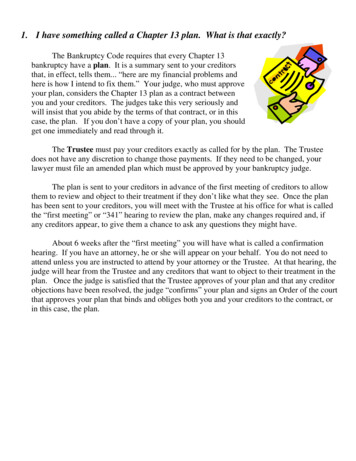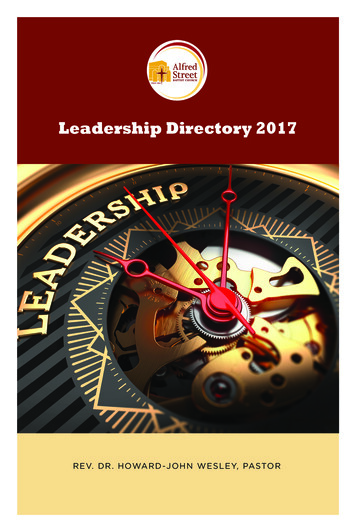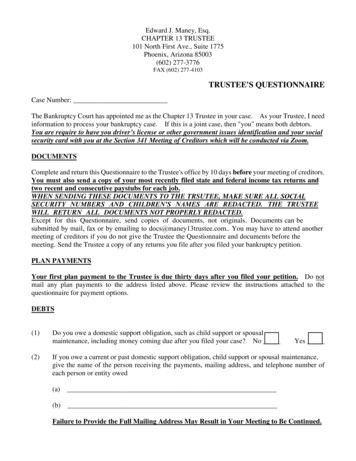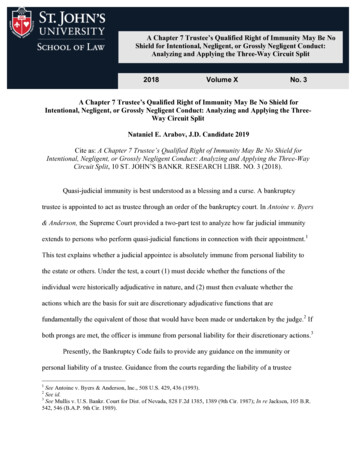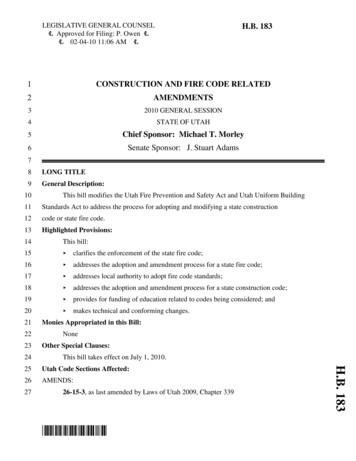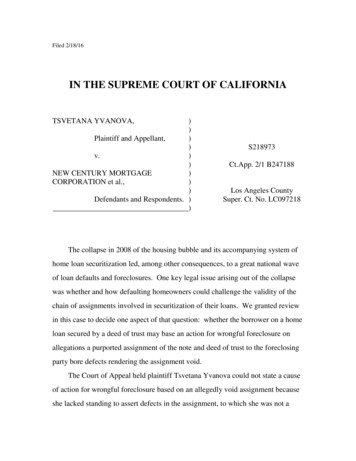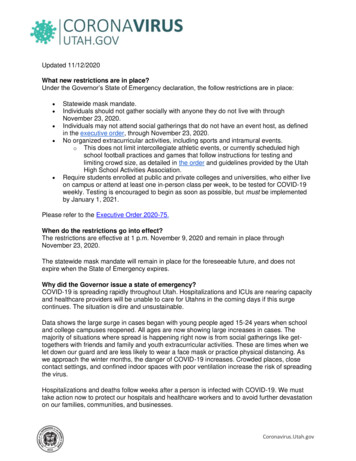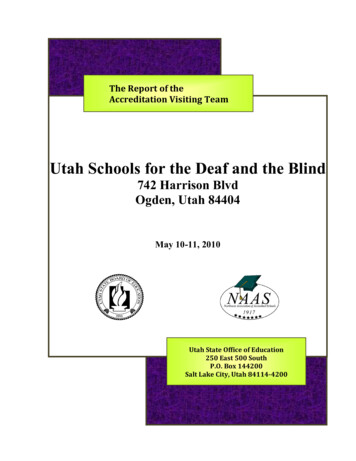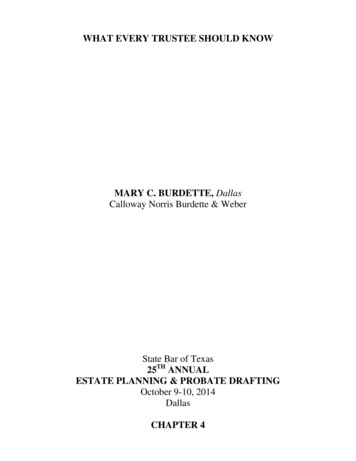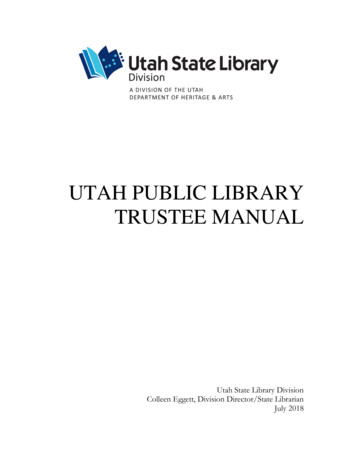
Transcription
UTAH PUBLIC LIBRARYTRUSTEE MANUALUtah State Library DivisionColleen Eggett, Division Director/State LibrarianJuly 2018
Utah Public Library Trustee ManualDepartment of Heritage and ArtsUtah State Library DivisionColleen Eggett, Division Director/State Librarian250 N 1950 W, Suite A, Salt Lake City, UT 84116-7901July 2018. Utah State Library Division. This work is licensed undera Creative Commons Attribution-Share Alike 4.0 International 4.0/http://library.utah.gov/publications
Table of ContentsLIBRARIES: AN AMERICAN VALUE . 5SECTION I – GOVERNANCE . 6CHAPTER 1 – TRUSTEESHIP . 6CHAPTER 2 – LEGAL RESPONSIBILITIES . 8CHAPTER 3 – CODE OF ETHICS .12CHAPTER 4 – ORGANIZATION AND MEETINGS .14 MEANINGFUL MEETINGS .15 TIPS FOR CONDUCTING MEETINGS .16CHAPTER 5 – ROLE OF THE STATE LIBRARY .18CHAPTER 6 – STATE CERTIFICATION AND GRANTS .19SECTION II – PLANNING .21CHAPTER 7 – STRATEGIC PLANNING .21CHAPTER 8 – BUILDINGS & ADA .23SECTION III – PERSONNEL .25CHAPTER 9 – HIRING A DIRECTOR .25SECTION IV – POLICY MAKING .27CHAPTER 10 – POLICY MAKING .27CHAPTER 11 – INTERNET SERVICES AND PRIVACY .29SECTION V – FINANCES .31CHAPTER 12 – BUDGETING AND FINANCE .31SECTION VI – PUBLIC RELATIONS .33CHAPTER 13 – ADVOCACY & PUBLIC RELATIONS .33CHAPTER 14 – FRIENDS & FOUNDATIONS .35SECTION VII – CONTINUING EDUCATION.36CHAPTER 15 – ROLES AND GOLDEN RULES .36CHAPTER 16 – CONTINUING EDUCATION .39APPENDIX A – LIBRARY BOARD TERMS .41APPENDIX B – COMMUNITY LIBRARY ENHANCEMENT FUND (CLEF) .43APPENDIX C – SAMPLE LIBRARY BOARD BYLAWS .45APPENDIX D – PUBLIC LIBRARY SERVICE RESPONSES .49APPENDIX E – STATE PROFESSIONAL ORGANIZATION .50APPENDIX F – NATIONAL PROFESSIONAL ORGANIZATION .51APPENDIX G – LIBRARY BILL OF RIGHTS .52APPENDIX H – LIBRARY DIRECTOR JOB DESCRIPTION .53APPENDIX I – LIBRARY TRUSTEE SELF-EVALUATION .54APPENDIX J – BOARD OF DIRECTORS SELF-EVALUATION .55APPENDIX K – A COMPARISON OF ROLES & RESPONSIBILITIES OF PUBLIC LIBRARYTRUSTEES AND LIBRARY DIRECTORS .56APPENDIX L – SAMPLE OUTLINE OF A TRUSTEE ORIENTATION & DEVELOPMENT PLAN .62APPENDIX M – SELECTED RESOURCES .64APPENDIX N – ETHICAL RESPONSIBILITIES FOR FIDUCIARY BOARDS .65APPENDIX O – SAMPLE AGENDA PROCEDURE .66APPENDIX P – GLOSSARY .68Utah Public Library Trustee ManualVersion: July 20183
Dear Library Trustee:Thank you for the important work that you do in serving the libraries in Utah. Yourwork is vital to a civic society and is critical to the success of your library. Yourepresent the people in your community and I appreciate the many ways that youserve them.The purpose of this manual is to guide you and to help make your experience asa member of the Library Board of Trustees a meaningful one, both for you andfor your library constituents. It is important that you understand your role.Your library board position means being an advocate for your library,participating actively in the planning process, and working cooperatively withyour library administration and government officials in developing policies thatserve your community. You will be supporting and encouraging your librarydirector in his/her efforts to sustain and improve the library.Be prepared to attend board meetings and contribute positively to groupdeliberations. You are in a unique and wonderful position to make a meaningfuldifference in the community in which you live. Please know that we support youin all that you are undertaking. You will want to become involved on the locallevel, and many board of trustee members also become involved on State andNational levels as well.Consultants at the State Library are here to help you and your library administration.We invite you to attend training opportunities in all areas of library service, includingtraining specifically developed for board members. Our consultants, our training, andthis manual will help you become knowledgeable about funding opportunities, library“best practices,” and how to be a better board member.Thank you for joining us in our mission of providing the best possible library service toUtahns.Best regards,Colleen EggettState Librarian/ Director, Utah State Library DivisionUtah Public Library Trustee ManualVersion: July 20184
Libraries: An American ValueLibraries in America are cornerstones of the communities they serve. Free access to thebooks, ideas, resources, and information in America’s libraries is imperative for education,employment, enjoyment, and self-government.Libraries are a legacy to each generation, offering the heritage of the past and the promise ofthe future. To ensure that libraries flourish and have the freedom to promote and protect thepublic good in the 21st century, we believe certain principles must be guaranteed.To that end, we affirm this contract with the people we serve: We defend the constitutional rights of all individuals, including children andteenagers, to use the library’s resources and services; We value our nation’s diversity and strive to reflect that diversity by providing a fullspectrum of resources and services to the communities we serve; We affirm the responsibility and the right of all parents and guardians to guide theirown children’s use of the library and its resources and services; We connect people and ideas by helping each person select from and effectively usethe library’s resources; We protect each individual’s privacy and confidentiality in the use of libraryresources and services; We protect the rights of individuals to express their opinions about library resourcesand services; We celebrate and preserve our democratic society by making available the widestpossible range of viewpoints, opinions, and ideas, so that all individuals have theopportunity to become lifelong learners — informed, literate, educated, andculturally enriched.Change is constant, but these principles transcend change and endure in a dynamictechnological, social, and political environment.By embracing these principles, libraries in the United States can contribute to a future thatvalues and protects freedom of speech in a world that celebrates both our similarities andour differences, respects individuals and their beliefs, and holds all persons truly equal andfree.Adopted by the ALA Council, February 3, 1999Source: American Library AssociationUtah Public Library Trustee ManualVersion: July 20185
SECTION I – GOVERNANCEChapter 1 – TrusteeshipCongratulations on your appointment to the board of trustees for your local public library. Itwill soon become apparent that your new position requires dedication, knowledge, andaccountability, just like any other job. Take time at the beginning of your appointment tobecome acquainted with the roles, responsibilities and special powers assigned to librarytrustees. You are in for a very rewarding experience.As trustees of libraries, we have been entrusted with the noblest task of all – to preserve,strengthen, and promote the growth and use of our community’s libraries. We mustmaintain the heritage that libraries hold for the future good of our society. The libraryfor which we work today will long outlive us and will provide inspiration andencouragement for generations to come. As the Information Age progresses,libraries are more than ever important to the maintenance of civilization as we know itand as we wish it to be.(Jane Bellon, Illinois Trustee Facts File, 1997 edition, p.1)Public Tradition and Public TrustThe library board is established by Utah law. Library trustees are public officials and thepowers delegated to library boards are a public trust. Library trustees are the eyes and ears ofthe community. They bring the citizens’ perspective to board business.Public Library trusteeship is a fundamental part of the American tradition which holdsthat in the long run, the people control their public institutions. One of the mostdemocratic of American political traditions is to give the legal authority for theoperation of public agencies to boards made up of members of the general public.Thus, the public library board is not just another social organization. It is an example ofa great democratic tradition. Being a library board member, then, is not just an honor. Itis a responsibility.(The Idaho Library Trustee Manual. 1996 edition, p.1)Utah Public Library Trustee ManualVersion: July 20186
Trustee Responsibilities in UtahOver 500 residents serve on Utah public library boards ensuring thatquality library and information services are available to all people in theState. Utah trustees are responsible for establishing a long-range plan fortheir library, actively promoting the library, setting policies to servecommunity interests, and advocating for library issues. In addition,boards oversee public funds and work to retain a qualified director.Trustees support their library’s efforts to meet State standards forcertified library service.As a library trustee, your primary role is that of a provider. You provide into theplanning process to develop library service. You see that sufficient funds are providedto implement library services You provide the policies necessary for the operation ofyour library facility. And you provide a qualified librarian to administer the day-to-dayoperations of your library.(Trustee Facts File. 3rd edition. Springfield, IL: Illinois Library Association and Illinois StateLibrary, 2004)Trustee or Board Member?The correct designation for your appointment may be either “library board director”,“trustee” or “board member”, and you are a member of a legally appointed board. The UtahCode refers to the library board entity as the “library board of directors”. Trustee and boardmember have the same meaning and are used interchangeably, to avoid confusion with thelibrary employee hired as Library Director.Fundamentally, library boards are involved with the process of decision making. Theymake decisions for their fellow citizens about their public library, and these decisionsdetermine whether the library will grow and flourish or wither and mold. It is the qualityof these decisions which validate the service of the board.(Library trustee a practical guidebook. Chicago: American Library Association, 1995, p.3)Utah Public Library Trustee ManualVersion: July 20187
Chapter 2 – Legal ResponsibilitiesStatutory PowersCounty and city library boards have similar roles, but there are subtle differences in theirlegal standing. Following is a comparison of the roles of the two groups as outlined in theUtah Code. For information on managing library board appointments and terms of service,see Appendix A Library Board Terms in this manual.City Library Board Duties(UCA 9-7-401 – 410)County Library Board Duties(UCA 9–7–501 – 511)With the approval of city government, the Board may control the expenditureof the library fund, of construction,lease, or sale of library buildings andland, and oversee the operation andcare of the library. the Board may purchase, lease, or sellland, and purchase, lease, build, or sellbuildings for the benefit of the library.With the approval of the county executive and inaccordance with county ordinances, policies, andprocedures, the Board will be responsible for theexpenditure of the library fund, the construction, lease, or sale of librarybuildings and land, and the operation and care of the library. The Board will purchase, lease, or sell land, andpurchase, lease, construct, or sell buildings, forthe benefit of the library.The Board will maintain and care for the libraryand establish policies for its operation.The Board has the powers and duties given to it bycounty ordinance, including the establishment of policiesfor collections and information resources.The Board will make, amend, and revoke rulesfor the governing of the library.The Board will make rules, “consistent with countyordinances, policies, and procedures for the governing ofthe library”.The Board will make an annual report to the countyexecutive and the county legislative body on thecondition and operation of the library, including afinancial statement.The Board will recommend to the county executive aperson to serve as library director, who will be “executiveofficer” for the Board. The Library Director will hirelibrary personnel in accordance with County meritsystem.The Board will make an annual report to thecity government on the condition and operationof the library.The Board will appoint a library director whowill be “executive officer” for the Board. TheBoard will appoint other personnel upon therecommendation of the library director.The Board will control donations to the libraryand act as the trustees of the donation if in theform of property.Utah Public Library Trustee ManualVersion: July 2018Donations are made to the county government,“designated for the benefit and purposes of the library”.8
Specifically for City Library Board MembersAs a city library board member, you have been chosen by your city governing body. Yourboard will have between 5 and 9 members who live in the city jurisdiction, are capableindividuals, and are interested in good library service. Local laws may stipulate that themayor and/or city council choose board members based upon formulas designed to ensuregeographic, ethnic, or income diversity. There will likely be a member of the City Council onyour Board. His / Her roles include bringing the city’s political agenda to the table, ensuringthat the Board is following local laws, and contributing effort and expertise to improvelibrary service as a fellow board member.You will not be paid for your service, except that expenses incurreddoing board assignments may be reimbursed from library funds. Youwill be asked to serve for at least 3 years (1 term) and no more than 2consecutive full terms. You and the other board members will select achairman and any other officers you agree to every year. The mayor orcity council can remove you if you are guilty of misconduct or if youneglect your Board assignment.As a city library board member, you are part of a group that, within the constraints set byyour city government, has the power to: Decide how to spend library dollars for library buildings, maintenance, landpurchase, and operation; your board is the caretaker of the library and its assets forthe people of your city; Accept and control donations made for the benefit of the library; Establish policies for the library; you will decide the future direction of your libraryand how it serves its public, including the establishment of rules for patron behaviorand access; and Appoint a Library Director* and decide what he / she will do and how much moneyhe / she will be paid; the library director is the executive officer for your board andwill manage the day-to-day operations of the library.* In the majority of towns and cities in Utah, hiring and salary administration is afunction of the municipal personnel system. In actual practice, the library boardrecommends a candidate and local government “appoints” (hires) the employee.Utah Public Library Trustee ManualVersion: July 20189
Specifically for County Library Board MembersAs a county library board member, you have been chosen by your county governing body.Your board will have between 5 and 9 members who live in the county and are interested ingood library service. Local laws may stipulate that the mayor or county council choose boardmembers based upon formulas designed to ensure geographic, ethnic, or income diversity.There will be a member of the County Commission on your Board. His / Her roles includebringing the county’s political agenda to the table, ensuring that the Board is following locallaws, and contributing effort and expertise to improve library service as a fellow boardmember. You will not be paid for your service, except that expenses incurred doing boardassignments may be reimbursed from library funds.You will be asked to serve for at least 4 years (1 term) and no morethan 2 consecutive full terms. You and the other board members willselect a chairperson and any other officers you agree to every year.The County Executive can remove you if you are guilty ofmisconduct or if you neglect your Board assignment.As a county library board member, you are part of a group that,within the constraints set by county laws, has the power to: Decide how to spend library dollars for library buildings, maintenance, landpurchase, and operation; your board is the caretaker of the library and its assets forthe people of your county; Establish policies for the library; you will decide the future direction of your libraryand how it serves its public, including the establishment of rules for patron behaviorand access; and Recommend a Library Director to the County Executive; the library director is theexecutive officer for your board and will manage the day-to-day operations of thelibrary.Liability ProtectionAs a legally appointed public officer, you are protected from lawsuits against actions you takein the performance of your official duties. Utah Code, Title 63G - Chapter 07 –Governmental Immunity Act of Utah, describes the conditions of immunity applicable togovernment officers and trustees.Utah Public Library Trustee ManualVersion: July 201810
Open MeetingsAll meetings of a public body, such as a library board, must be advertised in publicmedia/forum and open to the public. Utah Code, Title 52 – Chapter 4 – Open and PublicMeetings Act, clearly states that meetings concerning the public’s business must beconducted openly. Only under certain conditions, such as discussion of personnel issues, thesale of property, or legal actions, may board meetings be closed to the public (UCA 52-4205). This Statute also imposes a class B misdemeanor penalty for “ a member of a publicbody who knowingly or intentionally violates or abets any of the closed meetingprovisions of this chapter ” (UCA 52-4-305). We encourage you to review the Open andPublic Meetings Act in the Utah Code, Title 52 – Chapter mlVisit the Utah Public Meeting Notice website at http://pmn.utah.gov to register,search, and post you library’s meetings.Library Laws of UtahThe State Library maintains an online quick reference guide toLibrary Laws and Legislation. It is always advisable for boards toobtain an opinion from their local attorney for correctunderstanding and interpretation of these laws when applied to aspecific situation. See http://library.utah.gov/library-lawsA trustee remembers that: the library Board acts only as a wholethe library Board must authorize an individual to act on behalf of the librarythe Board does not run the day-to-day operations of the library(Montana Public Library Trustee Handbook)Utah Public Library Trustee ManualVersion: July 201811
Chapter 3 – Code of EthicsThe public expects and laws require that your performance always be above question and forthe public good. Boards should adopt a code of ethics to guide the conduct of its membersand then review it whenever a new board member is appointed. A code of ethics reinforces atrustee’s obligation to refrain from taking any official action that produces a substantialfinancial benefit to the trustee, the trustee’s family, or an organization in which the trusteehas a significant financial interest. Individual trustees may not negotiate or bid for or enterinto a contract in which he/she has a direct or indirect financial interest. For a summary ofethical duties see Appendix N Ethical Responsibilities for Fiduciary Boards.Ethics for Utah Public OfficersStandards of conduct for officers and employees of the State ofUtah and its political subdivisions in areas where there are actual orpotential conflicts of interest between their public duties and theirprivate interests are set forth in the Utah Code, Title 67 – Chapter16 – Utah Public Officers’ and Employees’ Ethics Act. TheCode further prohibits public officers from improperly disclosing orusing private, controlled or protected information, accepting gifts,compensation or loans, or requiring payment in exchange forapprovals.Public Library Trustees Ethics StatementPublic library Trustees are accountable for the resources of the library as well as to see thatthe library provides the best possible service to its community.Every Trustee makes a personal commitment to contribute the time and energy to faithfullycarry out his/her duties and responsibilities effectively and with absolute truth, honor andintegrity. Trustees shall respect the opinions of their colleagues and not be critical ordisrespectful when they disagree or oppose a viewpoint different than their own.Trustees shall comply with all the laws, rules and regulations that apply to them andto their library.Trustees, in fulfilling their responsibilities, shall not be swayed by partisan interests,public pressure or fear of criticism.Trustees shall not engage in discrimination of any kind and shall uphold librarypatrons’ rights to privacy in the use of library resources.Trustees must distinguish clearly in their actions and statements between theirpersonal philosophies and attitudes and those of the library, acknowledging andsupporting the formal position of the Board even if they disagree.Utah Public Library Trustee ManualVersion: July 201812
Trustees must respect the confidential nature of library business and not disclosesuch information to anyone. Trustees must also be aware of and in compliance withFreedom of Information lawsTrustees must avoid situations in which personal interests might be served orfinancial benefits gained as a result of their position or access to privileged libraryinformation, for either themselves or others.A Trustee shall immediately disqualify him / herself whenever the appearance of or aconflict of interest exists.Trustees shall not use their position to gain unwarranted privileges or advantages forthemselves or others from the library or from those who do business with thelibrary.Trustees shall not interfere with the management responsibilities of the director orthe supervision of library staff.Trustees shall support the efforts of librarians in resisting censorship of librarymaterials by groups or individuals.Approved by the United for Libraries Board in January 2012Source: United for Libraries – Association of Library Trustees, Advocates, Friends and FoundationsThe Freedom to ReadThe freedom to read is essential to our democracy. It is continuously under attack.Private groups and public authorities in various parts of the country are working toremove or limit access to reading materials, to censor content in schools, to label“controversial” views, to distribute lists of “objectionable” books or authors, and topurge libraries. These actions apparently rise from a view that our national tradition offree expression is no longer valid; that censorship and suppression are needed tocounter threats to safety or national security, as well as to avoid the subversion ofpolitics and the corruption of morals. We, as individuals devoted to reading and aslibrarians and publishers responsible for disseminating ideas, wish to assert the publicinterest in the preservation of the freedom to read.(Excerpt from the American Library Association’s Freedom to Read Statement)Utah Public Library Trustee ManualVersion: July 201813
Chapter 4 – Organization and MeetingsBuilding a strong library board does not happen by accident. It takes time, patience, goodbusiness practices, and team effort. Conducting board business means following yourbylaws, supporting group decision making, and doing your part to make meetings effectiveand worthwhile.Bylaw BasicsWell-crafted bylaws help provide for the smooth and effective functioning of a library board.The bylaws are a set of rules that define the operational procedures of the board. Thebylaws of a public library board in Utah must not conflict with federal or state laws or localordinances. Boards should review bylaws annually and amend them as necessary.Sample Bylaws The name of the board The constituency served by thelibrary and its boardThe schedule (frequency) of boardmeetings The composition of the boardProcedure for calling specialmeetings of the board Procedure for election orappointment of board trustees Specification of a quorum Terms of board trustees(See Appendix C for anotherexample of board bylaws. Procedure for filling an unexpiredtrustee termWorking as a BoardFull board authority: Board members do not have authority as individuals. A library boardcommittee cannot act on behalf of the full board. Only actions approved by the full boardhave legal authority. Likewise, individual board members and board officers can performofficial actions on behalf of the board only with specific authorization from the full board.Normally, a majority of the membership of a library board constitutes a quorum, but thelibrary board may establish its own definition of a quorum (the minimum number ofmembers that must be present to conduct business) in its bylaws.Utah Public Library Trustee ManualVersion: July 201814
Collective decision making: Legal responsibility for overall library operations rests in thelibrary board, not individual trustees. Therefore, it is important for the board president touse leadership techniques that promote effective group decision making on the part of theentire library board, not decision making by a few board members, or the library director, orany other individual.Voting rights: Only legally appointed library board members can vote on board matters.Some library boards may consider certain officials ex officio board members, such as thelibrary director or city manager. However, no other government official or person who is notappointed to the board is legally authorized to vote on library board matters. Meaningful Meetings Preparing the AgendaA well-run board meeting depends on a carefully planned agenda. The board chairpersonand library director should work together in preparing materials to be sent out to boardmembers at least one week before each meeting. Typically, the library director will contactthe library board president to discuss planned agenda subjects, including any i
Utah Public Library Trustee Manual . Department of Heritage and Arts . Utah State Library Division . Colleen Eggett, Division Director/State Librarian . 250 N 1950 W, Suite A, Salt Lake City, UT 84116- 7901 . July 2018. Utah State Library Division. This work is licensed under a Creative Commons Attribution-Share Alike 4.0 International License,
